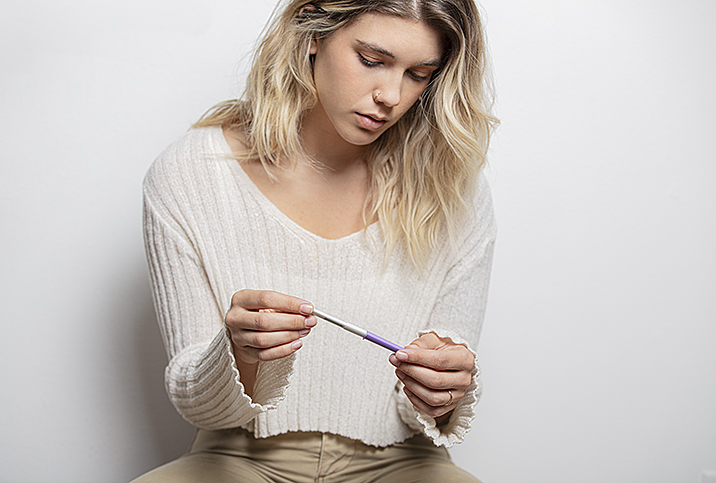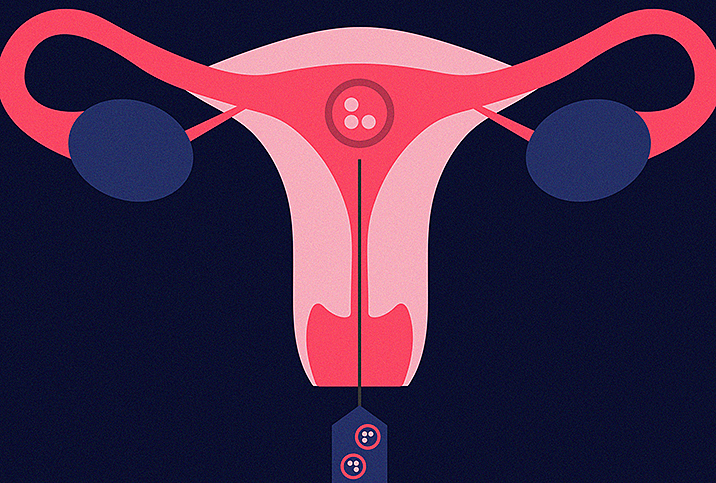Understanding Secondary Infertility

Maybe you've got a preschooler ready to enter kindergarten and suddenly baby fever hits, but as the months pass, the pregnancy tests keep coming back negative.
Or maybe you had your first baby at a young age and now you're in your mid-30s with a new partner and ready to add to the family, but your egg supply just isn't what it used to be. Maybe a traumatic birth left you with internal scar tissue that was discovered only when you started trying for the next baby.
Whatever the case, your attempts at getting pregnant are coming up short, and you're left to manage the mental, physical and emotional challenges of secondary infertility.
The basics of secondary infertility
Just because you have one or more children running around your house doesn't necessarily mean it'll be easy to get pregnant again when you want to expand your family.
Essentially, that's what secondary infertility is.
"Secondary infertility is diagnosed when a patient has a prior history of pregnancy but currently has infertility: 12 months of attempted conception with no pregnancy in patients under 35 years, or six months of attempted conception in patients over 35 years," explained Samantha Schon, M.D., an assistant professor specializing in reproductive endocrinology and obstetrics and gynecology at the University of Michigan Health.
Secondary infertility, for the most part, isn't all that different from primary infertility. The causes are often the same, as are most treatment options. What's different is that you've already experienced at least one full-term pregnancy. The reality of finding a second pregnancy harder to come by may be a shock that takes a different type of toll than primary infertility.
Causes of secondary infertility
Infertility, whether primary or secondary, is typically caused by the following issues, according to the World Health Organization (WHO):
- Tubal disorders, such as blocked fallopian tubes, caused by untreated sexually transmitted infections (STIs), unsafe abortions, postpartum sepsis or abdominal/pelvic surgery, including cesarean sections
- Uterine disorders, which include endometriosis and fibroids
- Ovarian disorders, such as polycystic ovary syndrome (PCOS)
- Endocrine system disorders related to hormones
Of course, age and a decreasing number of quality eggs certainly play a role, too, as does the reality of male factor infertility, where the male partner has a low sperm count or poor sperm motility.
While it's often overlooked, lifestyle can also be a factor, the WHO noted. Smoking, drinking alcohol excessively or being obese can all negatively impact fertility.
As people age, they're more likely to be less active and put on weight, which, ultimately, can impact health status and hormone levels, all of which may play a role in making it harder to get pregnant as the years pass.
Some women may have had pregnancy or birth-related complications that make a second pregnancy more challenging.
The unique (and often overlooked) challenges of secondary infertility
Where primary infertility has the risk of leaving a woman childless, that's not the case for secondary infertility. For a woman who already has one or more children, her feelings surrounding infertility may be overlooked, downplayed or made to seem insignificant because she's already a mom.
This tendency isn't necessarily just from outside sources. The woman experiencing secondary infertility may even try to suppress her own feelings of sadness because she thinks she should be grateful for what she has, rather than wanting more.
"There are unique mental challenges of secondary infertility as patients sometimes feel guilty about their feelings of sadness or disappointment when they have children at home," Schon said. "Well-meaning friends and family may tell the patient they should feel grateful for the children they do have, which, ultimately, makes the patient feel much worse."
The day-to-day life stressors may also be different the second time around, which can compound the challenges of getting pregnant.
"With secondary infertility, you have different stressors, the big one being that many people have a toddler at home when they're trying for another baby, so you have a different level of stress," said Elizabeth King, a certified fertility health coach, birth and bereavement doula and new parent educator in Irvine, California. "Some people also experience a mental block about, 'Well, I've done it before, so why can't I do it again?' There's a lot of body shaming [related to biology] that comes with it."
A possible delay in medical intervention
It's also likely that if a woman has had a previous, successful pregnancy, she may be less likely to seek medical assistance as soon as she's struggling to become pregnant another time. She may simply think, "just one more month, just one more month," because she assumes it will happen, rather than identifying and addressing the issue promptly.
Of course, the internalized feelings of guilt may play a role in delayed treatment. If a woman, or her family and friends, is emphasizing how lucky she is to have children already, she may feel more guilt for seeking treatment.
But Schon wishes that women, and their well-meaning family and friends, would let go of the guilt.
"Infertility, whether it's primary or secondary, is a disease. Just because someone has a child or children already, don't assume that their family is complete or that experiencing infertility is any less difficult," she said.
Schon also advised that if you're younger than 35 and have not achieved a pregnancy in 12 months, or if you're older than 35 and have been trying for six months, you should seek help.
Most general OB-GYNs do an initial workup of infertility and can even treat the problem if it's caused by oligoovulation, which is infrequent or irregular ovulation. If your primary OB-GYN can't solve the problem, they can refer you to a reproductive endocrinologist or infertility expert for further care.
Treatment options for secondary infertility
The treatment options for secondary infertility are the same as for primary infertility. But first, the underlying cause needs to be discovered, so schedule an appointment with a fertility clinic to undergo testing.
"Possible treatments may include oral or injectable medications, procedures such as intrauterine insemination, or even in vitro fertilization using the patient's own eggs or possibly even eggs from a young, healthy donor," Schon said.
King also emphasized that working with a professional, such as a fertility coach or therapist, to address the mental and emotional challenges that accompany infertility is a good idea, too.
Just remember, it doesn't matter if you already have children or not, infertility is a physical and emotional challenge that deserves to be addressed. Don't hesitate to seek assistance, and don't apologize for it, if you want to expand your family. And don't lose hope. Most families can find a way to expand with guidance and assistance from the medical community.


















